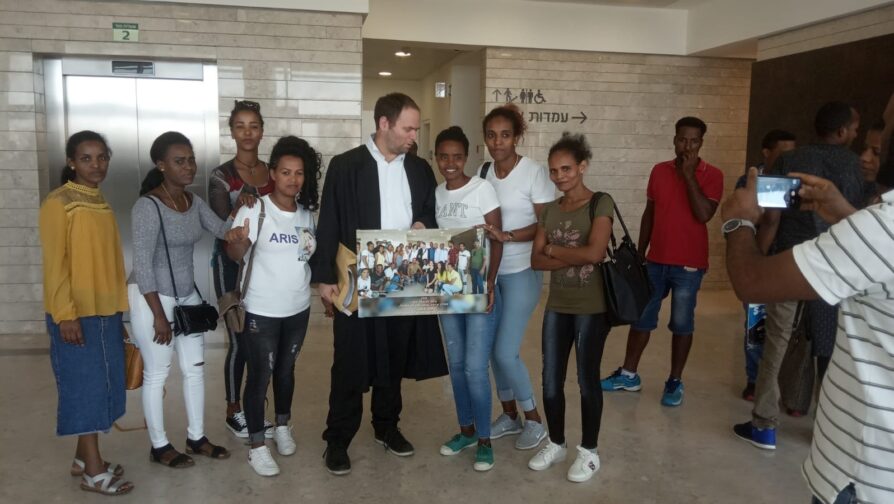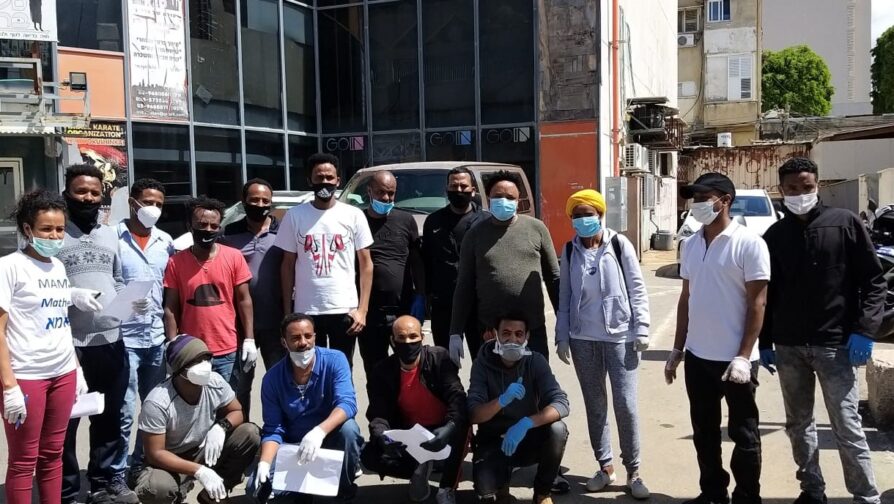Million Johannes Gabarkrestus is a volunteer and social activist who led the tenacious social and legal struggle in her hometown of Petah Tikva, which ended in the successful enrollment of children in kindergartens and schools in the city. Her struggle for access to education, along with her volunteering as a linguistic and cultural mediator and her activities in distributing food to needy families during the Corona virus period, transformed her into a key leader in the Eritrean asylum-seeker community.
Million Johannes Gabrekristos, 34, born in Asmara, the capital of Eritrea, is a married mother of three young children born in Israel. In 2004, after completing her studies, she was sent to the military base in Sawa to complete her final year of high school. As is customary there, two months are devoted to military training before the beginning of the school year, during which Million trained and at the end fell ill. She returned home to Asmara with permission and since then has been unable to complete her final school year. “I really wanted to study journalism at university but to do so I had to complete high school, so I tried to go back to Sawa again, but my illness did not allow it …”.
A few years later, in 2012, after her partner fled the country due to his forced military service, she too fled Eritrea, following him out of a desire for freedom and to fulfill her dream of studying and becoming a journalist.
Upon leaving Eritrea, she stayed in neighboring Sudan for several days, in Shagerab refugee camp, and from there continued her journey toward Israel, following her husband. “The route to Sinai was very difficult. It took us a whole month to get there and during the journey I witnessed difficult sights and people who did not survive…”.
In June 2012, Million entered Israel and was transferred to the Saharonim detention facility, where she was held for a long period of one year and four months. “Refugees in Israel face difficulties everywhere you go,” says Million; “Whether it’s in a clinic to receive medical treatment, in the Ministry of the Interior for visa renewal or in the municipality to enroll your children in school and kindergarten. Everywhere, refugees have a different ID number and are met with a disrespectful attitude.”
Million currently works as a cleaner in a residential building, but she devotes most of her free time to her community and to promoting options for the children. She began her volunteer work as a mediator and translator from Hebrew to Tigrinya in her daughter’s kindergarten: “When my daughter started learning in a municipal kindergarten, the teacher asked me to help with translation and mediation. When my son entered kindergarten, it was clear to me that I would help there as well.”

Million (thirds women from the right) in the District Court of Petach Tikva, with Att. Haran Reichman (holding the photo) and the community activists / @ Million Johannes Gabrekristos
The situation of the children in the city worsened when the municipality refused to enroll the children in the city schools in 2019. Million, along with her community members, tried to approach the municipality but the doors were closed to them: “The employees in the municipality told us that there was no reason to enroll the children in school in the city because we would soon be returned to Eritrea”, continues Million. “I was sad to see parents who failed to enroll their children and in the end the children who sat at home without an educational framework. A member of our community contacted ASSAF and they connected us to The Clinic for Law and Educational Policy at the University of Haifa. That is how we began our battle for our children’s education.”
The struggle of Million and the community of Eritrean asylum-seekers in the city of Petah Tikva was successful, and following the court ruling, children were enrolled in municipal kindergartens and in Grade One.

Million (third from the right) with the community activists distributing food assistance during COVID-19, in Petach-Tikva / @ Million Johannes Gabrekristos
During the Corona period, a group was organized that included Million and six of her friends, to help community members who found themselves in financial distress: “We gathered money from everyone, each according to their ability, and managed to pay rent for people who were unable to pay because they lost their jobs when they were sent on unpaid leave due to the Corona crisis. Unlike the Israelis, they were not entitled to unemployment benefits, so there was a real fear that they would lose their apartments and be thrown out onto the street…The organization “Petah Le’Tikva” (‘Opportunity for Hope’) brought us food packages and clothes that my friends and I distributed, according to their needs. The Organization continues to support us today through group activities, rent financing and donations for various purposes.”
Recently, during 2021, Million was selected by the United Nations High Commissioner for Refugees in Israel to take an active and central part in working with and for the community, as part of the Refugees Outreach Volunteers project. The project is implemented by representatives of the asylum-seekers and refugee communities across the country, with the aim of making rights accessible to community members in the areas in which they live in Israel, assisting those in need of guidance, providing information, and initiating and organizing community meetings.
Share on Facebook Share on Twitter